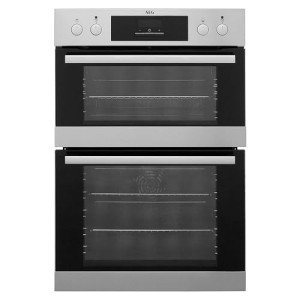10 Amazing Graphics About Oven Built In
페이지 정보

본문
Understanding Built-in Electric Ovens: A Comprehensive Guide
In modern kitchen areas, built-in electric ovens have actually become a standard feature, supplying convenience, effectiveness, and an elegant combination into kitchen style. This article intends to notify property owners and cooking lovers about the advantages of built-in electric ovens, key factors to consider when picking one, and upkeep pointers to guarantee lasting performance.
What is a Built-in Electric Oven?
A built-in electric oven is developed to be set up within kitchen cabinetry or walls, perfectly blending into the kitchen's architecture. Unlike standalone ovens, these designs conserve floor space and can be situated at eye level, facilitating simple gain access to and tracking while cooking.
Benefits of Built-in Electric Ovens
- Area Efficiency: These ovens use vertical space, making them ideal for smaller sized cooking areas or those aiming to take full advantage of counter area.
- Visual Appeal: Built-in ovens offer a tidy and contemporary look that enhances the kitchen built in oven's overall style.
- Ergonomics: They are set up at comfy heights, lowering the pressure on the back and knees, particularly when packing or unloading meals.
- Advanced Features: Many built-in integrated electric ovens ovens featured high-tech functions like wise controls, convection cooking, and self-cleaning choices, which can make cooking much easier and more effective.
- Improved Functionality: Models frequently consist of additional functions such as several cooking modes, timers, and temperature probes.
Key Considerations When Choosing a Built-in Electric Oven
When selecting a built-in electric oven, several factors must be taken into account to guarantee it meets your cooking requires and fits within your kitchen layout.
Size and Capacity
Built-in electric ovens generally come in different sizes. It's necessary to measure the assigned space to guarantee a correct fit. Here are common sizes:
- Single Oven: 24 to 30 inches wide, ideal for a lot of cooking tasks.
- Double Oven: Two different compartments, enabling you to cook multiple dishes at different temperature levels.
- Wall Ovens: Available in plus sizes, matched for substantial cooking experiences.
Functions
Selecting functions that line up with your cooking routines is essential. Think about the following options:
- Convection Cooking: Distributes heat uniformly for consistent outcomes.
- Smart Technology: Enables push-button control and pre-heating through mobile phone apps.
- Self-Cleaning: Simplifies maintenance and cleaning procedures.
- Steam Cooking: Adds wetness to dishes for better cooking results.
Setup Requirements
Built-in electric ovens need adequate electrical wiring and ventilation choices. It's suggested to talk to professionals during the installation phase to fulfill electrical codes and ensure safety.
Cost Range
The cost of built-in electric ovens can vary considerably from budget plan choices (₤ 600 - ₤ 1,200) to high-end models (₤ 2,000 and above). Consider your budget and cooking frequency when making a choice.
| Price Range | Features | Best For |
|---|---|---|
| ₤ 600 - ₤ 1,200 | Fundamental functions, manual controls | Casual cooks |
| ₤ 1,200 - ₤ 2,000 | Convection, clever innovation | Serious home cooks |
| Above ₤ 2,000 | Premium materials, advanced features | Professional chefs or premium cooking lovers |
Maintenance Tips for Built-in Electric Ovens
Ensuring that an electric oven operates effectively involves routine upkeep. Here are some useful tips:
- Regular Cleaning: Wipe down the door and inside the oven after each use to prevent grease buildup.
- Self-Cleaning Cycle: Utilize the self-cleaning function periodically (if available). Follow the producer's instructions for maximum effectiveness.
- Inspect Seals and Gaskets: Inspect the door seals for wear and tear to keep cooking performance.
- Adjust Temperature: Regularly check and adjust the builtin oven's temperature level for this precision cooking.
- Expert Servicing: Schedule annual upkeep consult certified specialists, especially for sophisticated designs with numerous electronic elements.
Frequently Asked Questions (FAQs)
1. Are built-in electric ovens more effective than standard ovens?
Yes, built-in electric ovens typically have better insulation and functions like convection cooking that can cook food faster and uniformly, saving energy.
2. Can I install a built-in electric oven myself?
While some handy individuals may pick to try a DIY setup, it is suggested to work with an expert to make sure safe and compliant installation.
3. How much power does a built-in electric oven use?
Usually, built-in electric ovens consume in between 2,400 to 5,000 watts, depending upon the design and features. Always refer to the producer's specs for accurate figures.
4. Do built-in electric ovens require special cabinetry?
Yes, built-in electric ovens require customized cabinets or wall enclaves that support their weight and enable for correct ventilation. Make sure that the cabinets abides by setup standards described by the producer.
Built-in electric ovens are an important addition to any modern-day kitchen, providing a variety of features that make cooking easier and Oven Built In pleasurable. By understanding the advantages, selection criteria, and maintenance requirements associated with these ovens, customers can make educated choices that align with their culinary requirements and lifestyle preferences.

- 이전글20 Insightful Quotes On Built-In Oven And Microwave 25.05.20
- 다음글9 . What Your Parents Taught You About Double Oven And Microwave Built In 25.05.20
댓글목록
등록된 댓글이 없습니다.